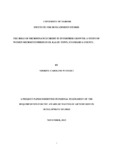| dc.description.abstract | Microfinance is recognised as a catalyst for enterprise growth in the World. In Kenya, the
microfinance industry has experienced robust growth. The country has over 5000
institutions that offer microfinance services. Since institutions that offer credit services
are increasing, it is expected that women are tapping into them for the growth of their
microenterprises. Nonetheless, credit utilization in enterprises varies as a result of
internal and external factors hence eliciting different effects on respective enterprises. In
Kenya, data that shows the influence of microfinance on women microenterprise
performance is scarce.
The study sought to investigate the role of microfinance in enterprise growth. The basic
argument is that credit may influence growth positively or negatively depending on the
internal and external characteristics of an enterprise. The study examined the influence of
credit sourced from KADET on women microenterprise growth in Ol Kalou town. To
achieve the study objectives, a field survey, key informant interviews and focus group
discussions were applied.
The study found that women microenterprise owners in Ol Kalou town have diverse uses
of credit. The use ranges from promoting business growth to meeting household needs.
Enterprise growth was manifested more in terms of product diversification, sales growth
and profit growth. The higher number of loans incurred had greater effect on enterprise
growth. Characteristics such as the age of the business owner and enterprise age were
found to influence enterprise growth.
The study concludes that microfinance influences enterprise growth in terms of sales,
product diversification and profits. Apart from credit, other factors that determine
enterprise growth include the age of the enterprise as well as the owner’s age. The study
recommends that in regulating the microfinance sector in Kenya, the interest rates should
be lowered. It also recommends that to promote enterprise growth, microfinance
institutions should review their institutional requirements such as weekly repayment
periods and loan grace periods. | en |

